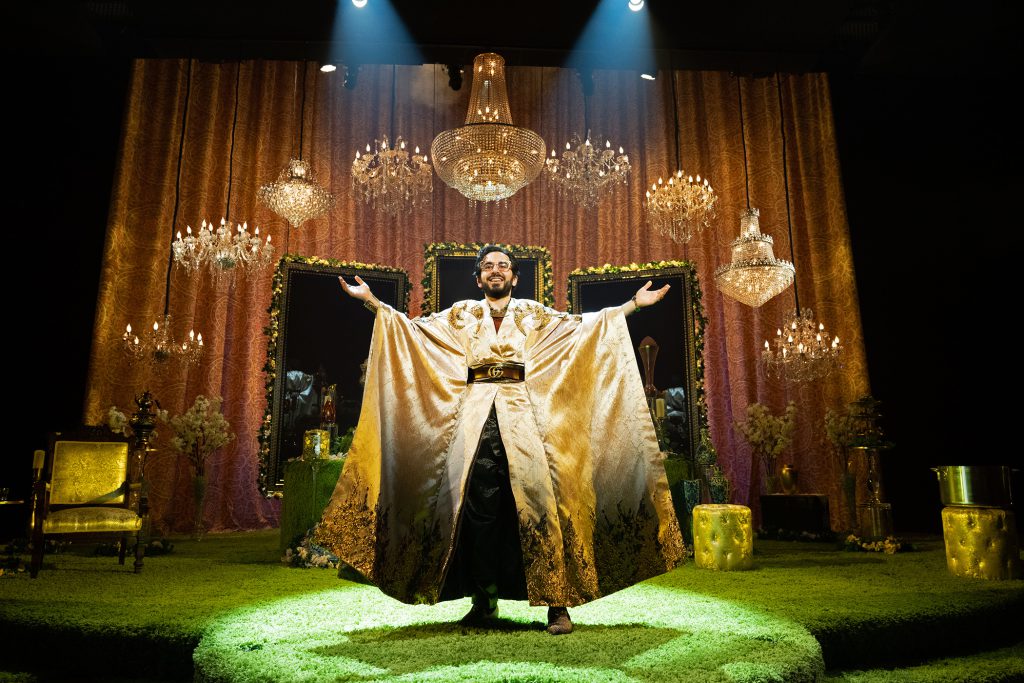
By Eric Marchese | Special to the NB Indy
The immigrant story usually tends to be about family, and about old versus new. South Coast Repertory has opened two such stories. Both – “Coleman ’72” (which closes May 14) and Michael Shayan’s “avaaz” (running through May 27) – are world premieres and both are part of this year’s Pacific Playwrights Festival, now in its 25th year.
“Avaaz” is Iranian-American playwright Shayan’s first play at SCR. Post-performance, Shayan tells us that “avaaz” “is the first major production of an Iranian play anywhere in the U.S.” As it has done so often in its existence, SCR has made history, something you can be part of by seeing this show.
Unlike the multi-character “Coleman,” though, “avaaz” is a solo show in which Shayan portrays his mother “Roya.” Roya isn’t his mom’s actual name but, rather, the name he has given to the persona he creates during the show’s 90 minutes.
Deftly directed by Moritz Von Stuelpnagel with respect for the play’s concept, structure and execution, “avaaz” consists of Shayan essentially speaking in his mother’s voice (the title is the Farsi word for “a song as it is being sung”), telling us about herself and her journey from Iran to the U.S., including giving birth to son Michael.
In effect, it’s a deeply personal tale that’s both individualistic and idiosyncratic and, at the same time, universal, delving into the challenges and obstacles faced by anyone who has ever been uprooted from their native country and pushed themselves to start anew in a strange land.
As patrons enter and take their seats, festive Iranian music plays overhead. They’re greeted by Shayan-as-Roya, who then steps onto the stage and segues directly into his script.
During Roya’s banter with us, she gives us a lighthearted crash course in Iranian history and culture, all along coaching us on how to pronounce key Iranian words.
We’ve been invited into Roya’s home to celebrate Nowruz, the Iranian New Year. This set-up is the ideal scenario through which Shayan can tell his mother’s story, rich in the kind of compelling drama and unexpected laughs that are inevitable when such tales are skillfully told.
And Shayan is a writer of great skill. He could have kept “avaaz” light and therefore superficial, clinging only to humor. He could have invested the script with sorrows that would likely play out as heavy-handed or have created a tribute so overly sentimental as to be unpalatable.
Instead, he and SCR’s production team and designers have crafted a singular tale that reveals almost as much about Shayan himself as it does the personality and life story of his mother.
A key example of this is when, early on, Roya relates that Michael is gay, indicating through gestures that her son’s demeanor is not only not flamboyant, but essentially inconspicuous.
It’s a crucial point, because it shifts the play’s emphasis from the ethnic and cultural identity and gender orientation of Shayan, that of a gay, Jewish Iranian-American, to the life, perspective and experiences of his mother.
Shayan’s skill at his craft can be seen in numerous ways, the most basic of which is the play’s structure, which eschews a simple, chronological then-to-now through-line in favor of random anecdotes and stories.
From these, we’re able to piece together a coherent picture of Roya’s life both in her native land, where the Islamic Revolution had sown change but also turbulence, and her new, adopted country.
Shayan is glib and at ease on stage, yet not overly slick, filtering his wry sense of humor through the Roya persona. His decision to forgo disguising himself as a woman is a wise one, as wigs, makeup, jewelry and a high-pitched voice would only trivialize issues that deserve dignity.
With this show, Shayan can be defined as a writer who acts (as opposed to an actor whose writing work is a sideline), and in this case that’s a good thing – again because it focuses our attention on Roya.
Boosting Shayan’s script and performance is Beowulf Boritt’s set, the centerpiece of which is an eye-popping Nowruz feast – rows and rows of tempting treats, all tied in with Iranian history, culture and tradition, all lit with glittering chandeliers.
Late in “avaaz,” we see a dramatic series of flashbacks to Iran, as key moments in Roya’s life are compressed in a stunning jumble.
Shayan wisely doesn’t belabor these scenes, giving us just enough for us to gain insight into Roya as she describes the grueling ordeal of waiting to be cleared to come to the U.S.
An undeniably complex character, Roya can be forgiven for any sort of identity crisis. She deserves our empathy and, even more so, our admiration.
As she tells us late in the play, she turned her back on Iran, “a country who turned her back on me.” She asks herself, and us, how she can be expected to love something “which gave me so much pain.”
Yet she does still love her native land – its sights and sounds and the familiar scents of jasmine and spices and foods – to a degree that’s really not so unusual.
Just as understandable is what motivated her to push forward even after tearing herself away from home and starting over in a strange world, especially once she became a mother. As she tells us, she has done it all “for my son.”
Shayan obviously knows this, or he couldn’t have – and wouldn’t have – written this play and shared it with the world, embodying all his mother represents and means to him.
His is a sensitive spirit using his eloquence to give voice to the often traumatic experiences of the woman who brought him into the world.
Segerstrom Stage, South Coast Repertory, 655 Town Center Drive, Costa Mesa. Through May 27. Running time: One hour, 30 minutes (no intermission). Tickets: $27 to $98. Purchase / information: 714-708-5500, www.scr.org.
